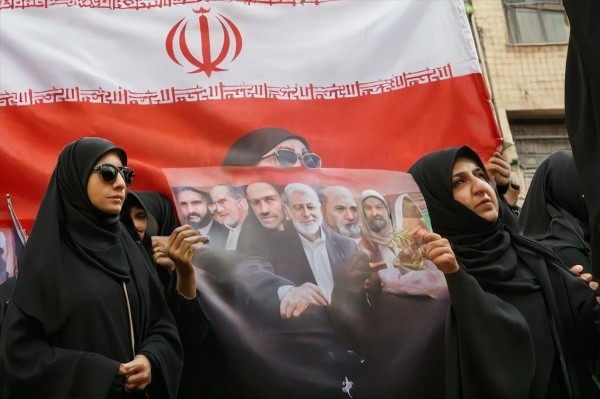Iran’s Plan to Strike Back Against the U.S.
Iran’s Military Preparations Following U.S. Attacks
Loading...

Statement by 57-nation bloc says it ‘holds Israel, the illegal occupying power, fully responsible for the heinous attack’.
The Organisation of Islamic Cooperation (OIC) has issued a statement holding Israel fully responsible for the attack that resulted in the death of Hamas political chief Ismail Haniyeh in Iran. The 57-member bloc, which describes itself as the collective voice of the Muslim world, convened an extraordinary meeting in Saudi Arabia to address the situation and express its stance on the matter.
OIC's Position and Concerns
The OIC's statement described the attack as a serious infringement of Iran's sovereignty and emphasized that it holds Israel, the illegal occupying power, fully responsible for the heinous act. The Gambia’s Foreign Minister Mamadou Tangara, who chairs the OIC, expressed deep concern over Haniyeh's assassination and the ongoing war in Gaza, warning that these events could potentially lead to a wider regional conflict.
Iran's Response and Threat of Retaliation
Iran, where the attack took place, has vowed to retaliate for the assassination of Haniyeh. The Iranian government has declared three days of national mourning and has blamed the United States for its support of Israel, holding it partially responsible for the attack.
Saudi Arabia's Stance
Host Saudi Arabia also condemned the assassination, describing it as a blatant violation of Iran's sovereignty. The kingdom's deputy foreign minister emphasized the rejection of any violation of the sovereignty of states or interference in their internal affairs.
International Response and Calls for De-escalation
The United States and other Western countries have been calling for de-escalation, expressing concerns that regional escalation could jeopardize the prospects of a ceasefire agreement in Gaza. The US State Department spokesperson emphasized the need for all parties involved to avoid steps that could escalate the conflict, highlighting the delicate nature of the situation and the potential for worsening the crises in the region.
US Involvement and Ceasefire Efforts
The US has been involved in ceasefire efforts and has presented a multiphased Israeli proposal to end the war, which includes the release of captives and prisoners leading to an enduring ceasefire. While the US initially blamed Hamas for the failure to reach an agreement, it has acknowledged that additional issues and facts on the ground have come into play since then, and there are still outstanding disagreements that need to be addressed by both Hamas and Israel.
Conclusion
The situation surrounding the assassination of Hamas chief Ismail Haniyeh has sparked international concern and calls for de-escalation. The OIC's strong stance, Iran's vow to retaliate, and the US's involvement in ceasefire efforts all contribute to the complex dynamics at play in the region. As the situation continues to unfold, efforts to address the root causes of the Israeli-Palestinian conflict and work towards a sustainable political solutionAssassination of Hamas Leader Ismail Haniyeh Sparks Outrage and Fears of Escalation
Killing Blamed on Israel, Condemned by OIC
On Thursday, August 08, 2024, the Organisation of Islamic Cooperation (OIC) held an extraordinary meeting in Saudi Arabia to address the killing of Hamas political chief Ismail Haniyeh in Iran. The OIC statement blamed Israel, the "illegal occupying power", for the "heinous attack" and held it "fully responsible" for the assassination.
The Gambia's Foreign Minister Mamadou Tangara, who chairs the OIC, warned that Haniyeh's "heinous assassination" and the ongoing conflict in Gaza could lead to a wider regional conflict. Iran and Palestine had called for the OIC meeting, and Saudi Arabia also condemned the violation of Iran's sovereignty.
Iran Vows Retaliation, U.S. Calls for De-escalation
Iran has promised to retaliate for Haniyeh's killing, threatening "harsh punishment" for Israel. The U.S. State Department, however, has been calling for de-escalation, with spokesperson Matthew Miller stating that regional escalation could jeopardize the prospects of a ceasefire agreement in Gaza.
Haniyeh was leading ceasefire talks for Hamas, but the U.S. has not condemned his assassination. The U.S. has previously vetoed UN Security Council measures calling for a ceasefire in Gaza, initially blaming Hamas for the failure to reach an agreement.
Implications for the Israeli-Palestinian Conflict
The killing of Haniyeh is seen as a significant blow to Hamas and could set back the chances of an imminent ceasefire agreement in the nearly 10-month-old war in Gaza. Hamas' armed wing has vowed that Haniyeh's death will "take the battle to new dimensions and have major repercussions".
The assassination also raises concerns about a wider escalation in the region, as Iran and its allies have threatened retaliation against Israel. The Gambian Foreign Minister urged the global community to work towards a "sustainable political solution that promote[s] peace and security for all people in the region."
Editor
Iran’s Military Preparations Following U.S. Attacks
Troops remain in five strategic locations, raising fears of renewed tensions and long-term occupation.
Opposition forces have taken control of the capital after a significant offensive. Here is how it unravelled.
